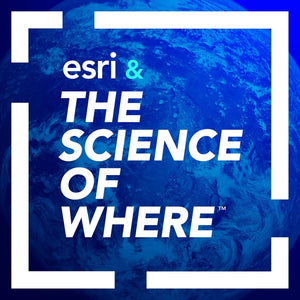
About
We talk to business and technology leaders who share analysis, insights, and stories on data science, the Internet of Things, Smart Communties and other forces driving digital transformation and leveraging the power of location intelligence.
Esri
30 Episodes
Episodes
Location Intelligence: A Critical Tool for Tackling Retail Crime
Dr. Read Hayes, criminologist and director of the Loss Prevention Research Council, explains how location technology is helping businesses understand and tackle retail crime.
Breaking the Bottleneck: The Tao and the Technology to Solve the Housing Crisis
Dmitry Kudinov, Esri manager of the AI Prototypes Team, explains how geospatial AI unlocks urban planning bottlenecks.
Geographies of Innovation: Real-Life Stories of Transformative Change
David Yarnold, author and former CEO of the Audubon Society, gives examples of how location technology is solving some of the world’s most challenging problems while speaking at Esri headquarters... more
Esri Chief scientist Dawn Wright explains why mapping the ocean in high resolution is key to keeping it healthy.
Bill Robberson, CTO of Kamilo and nationally recognized expert in plastics pollution research, describes how his company innovated a tracking process that verifies truly recycled plastic using location technology.
Peter Kemp, head of Change, Delivery, and Planning at the Greater London Housing Authority, explains how a smart map brings efficiency to housing development in London, England.
How the Community Map of Canada Impacts Public Safety and the Economy
Alex Miller, president of Esri Canada, explains how an authoritative crowdsourced digital map of Canada is playing a key role in improving economic health and public safety for Canadian communities.
Toronto resident Ingrid Buday describes the role geospatial technology plays in tackling the 2nd biggest urban health risk in Canada: noise pollution.
Brisbane's Bold Leap: How Digital Twins are Modernizing Infrastructure
Russell Vine, chief innovation officer at Cross River Rail, explains how a digital twin is helping Brisbane, Australia, build a $4-billion public transit project and prepare for the 2032 Olympics.
Personalized Banking: The Role of Location Technology in Modern Finance
Marilyn Howe, senior manager of advisory services at Diebold Nixdorf, explains how banks are using geospatial technology to better serve their customers and bring convenience to personal finance management.
David Yarnold, former CEO of the Audubon Society, explains why the world is increasingly taking a geographic approach to problem solving.
The Unifying Power of Geography: How Minnesota Gained Momentum through Mapping
Minnesota Governor and vice-presidential candidate Tim Walz explains how visualizing data through maps drives complex decisions in his home state. Walz delivers the keynote address at the 2024 Esri User... more
Nature Park: Educating a New Generation of Climate Change Innovators
Katie Hall, Schools Manager at Esri UK, explains how children mapping nature is preparing them for engaging the climate crisis.
James Fallows, author, journalist, and friend of Esri President Jack Dangermond, explains the art of storytelling and why geospatial technology is integral to tackling the world’s biggest challenges.
Jacquie Black, geography teacher at Bertha Park High School in Perth, Scotland, explains how geospatial technology deepens her students' understanding of the world.
James Cowan, CEO for The HALO Trust, explains how the humanitarian organization modernized its demining efforts while revitalizing communities.
Ned Mitchell, research civil engineer at the US Army Engineer Research and Development Center, explains how a digital twin of the Mississippi River's ports helps the flow of commercial goods.
Closing the Digital Divide: Lessons in Collaboration at an Irish Telecommunications Provider
Cade Wilkinson, head of planning at Irish telecommunications provider Fibrus, explains how technology enabled the company to connect 85,000 rural homes and businesses with high-speed broadband.
Jan Kestle, President of Environics Analytics, explains the value of organizing data around geographic analysis to gain competitive edge.
How Technology Safeguards the Colossal Fish of the Mekong Delta
Jeff Opperman, Global Freshwater Lead Scientist with World Wildlife Fund, explains how geospatial technology is being used to protect the Mekong Delta’s fragile fish population.
Jay Theodore, Esri Chief Technology Officer, explains why spatial analysis and AI—also known as GeoAI—is transforming decision making in business and government.
A Guide to Harnessing Location Intelligence for Competitive Advantage
Naz Ali, CBRE’s Senior Manager of Location Intelligence, explains how the largest commercial real estate firm helps its customers unlock a deeper understanding of market potential in their siting decisions.
How Technology is Transforming Canada's Child Search Network
Amanda Pick, CEO of the Missing Children Society of Canada (MCSC), explains how she helped move MCSC into the digital age and expand the search for missing children.
Archaeologists Allison Emerson and Alex Elvis Badillo explain how digital twin and 3D modeling technology reveals insights about life in the ancient city of Pompeii.
Scot McQueen, Senior Technology Officer at Forest Stewardship Council and President of the Board of Directors of World Forest ID, explains how tree traceability is striking a balance between profitability... more
D’Artagnan Scorza, Executive Director of Racial Equity for Los Angeles County, explains how LA County is using location technology and data to address social injustice in urban LA.
Dr. Marc Bierkens from Utrecht University talks about the National Geographic Society's interactive World Water Map, a project he led to bring attention and strategize solutions to the global freshwater... more
Koen Stolk, a location intelligence specialist for Esri, explains how a Dutch real estate firm uses mapping technology
World-Changing Storytelling: Insights from National Geographic Society CEO Jill Tiefenthaler
Two pioneers in geography, Esri President Jack Dangermond and National Geographic Society CEO Jill Tiefenthaler, discuss technology, geography, and the power of storytelling.
Esri senior writer Karen Sullivan discusses the legacy of forgotten black burial grounds and the initiative to document them.




